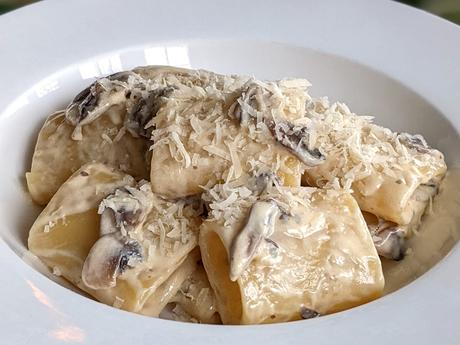
Paccheri are undoubtedly the most majestic kind of short pasta one can find! With a diameter of 1 ½ inch (4 cm), thick walls, and a rough surface, each guarantees an unbeatable bite, or two!
The Paccheri shape originates in the Campania region of Italy, which is also where you find Gragnano - a town near Naples recognized as the capital of dried pasta. As you can imagine, when I stumbled upon a box of Paccheri made in Gragnano, I couldn't resist!
However, I was still waiting for inspiration for the right sauce that would bring out the fantastic character of this pasta. As a northern Italian, now that it's colder outside, I naturally drifted towards creamy mushrooms. But that wasn't enough. So I added Gorgonzola for a pleasant blue kick and Mascarpone for extra creaminess and depth. The resulting recipe is very straightforward, quick to make, and very forgiving in the amounts, even in the timing.
Ingredients for 2 servings
- 5 oz Paccheri (150 g) (can also use Rigatoni or other short dried pasta of sufficient presence)
- 1 Tbsp coarse salt
- 5-6 chestnut mushrooms (about 100 g), sliced
- 2 garlic cloves, crushed
- 1 Tbsp butter
- 1 Tbsp olive oil
- 2 Tbsp white wine
- 2 Tbsp Mascarpone (about 75 g)
- 2 Tbsp Gorgonzola (about 75 g)
- 1/4 cup double cream
- 1/4 cup Parmigiano, grated
- table salt
Preparation
1. Bring a large pot of water to a boil, add a Tbsp of coarse salt per 2 liters of water.
2. In a large nonstick pan, heat up oil and butter, add the crushed garlic.
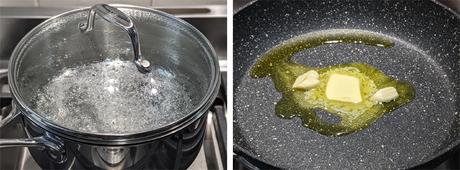
3. Add the sliced mushrooms to the pan and roast them at high heat.
4. Continue sautéing the mushrooms until they have softened.
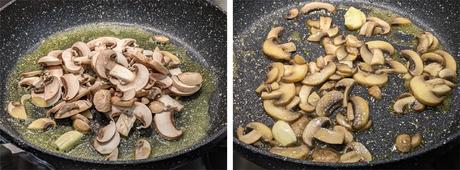
5. Start boiling the pasta for the time written on the box (usually around 14 minutes), which corresponds to an al-dente cooking level.
6. Add a splash of white wine to the mushrooms and let evaporate completely.
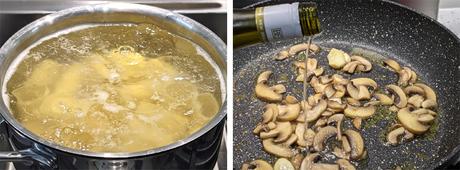
7. When the pasta is 5 minutes from ready, go back to the mushrooms, remove the garlic, and season lightly with salt.
8. Add the Mascarpone, Gorgonzola, and cream.
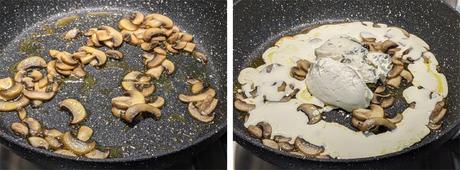
9. Still keeping very low heat, add ½ of the grated Parmigiano and mix everything into a creamy sauce. Note: should the sauce become too thick, add some of the pasta water.
10. When the pasta is ready, drain it quickly and add it to the pan with the sauce. Note: save some of the pasta water by draining the pasta back into the pan where it was boiled.
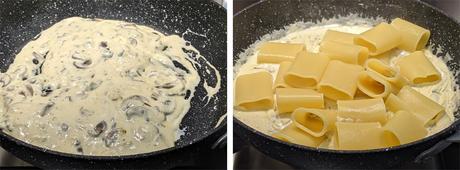
11. Finish cooking the pasta in the sauce for a couple of minutes, adding some of the pasta water to ensure the sauce remains silky smooth. This won't overcook the pasta.
12. Plate gently into preheated bowls, then sprinkle with the rest of the Parmigiano.
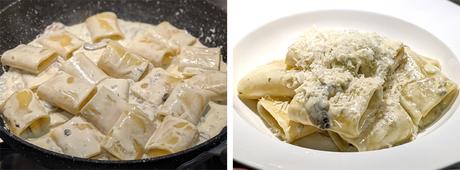
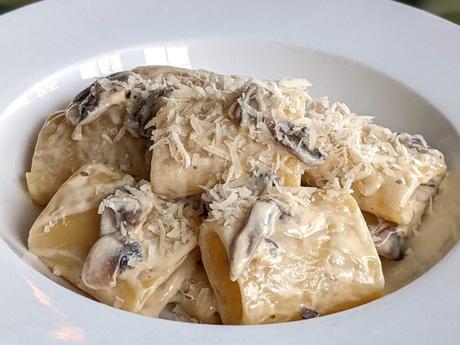
Ingredients
Preparation

Author: Paolo Rigiroli
Now based in the UK, Paolo is an Italian who lived in Canada for nearly 18 years and blogs about Italian food and its many aberrations. View all posts by Paolo Rigiroli

